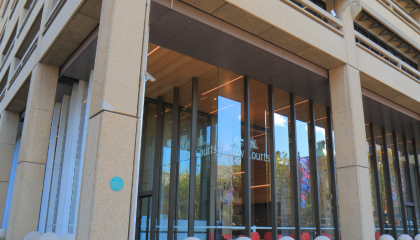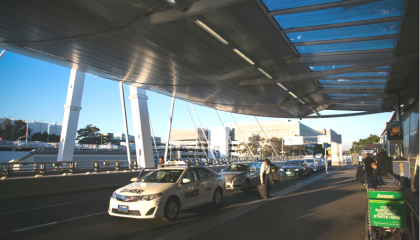The Point to Point Transport (Taxis and Hire Vehicles) Regulation 2017 (the Regulation) lists disqualifying offences. These offences automatically prohibit a person from driving a taxi or hire vehicle (including rideshare), even when a person is found guilty by a court, but no conviction is recorded.
Some offences will disqualify an individual from driving a taxi or hire vehicle for life; while others will disqualify them from driving a taxi or hire vehicle for a certain period. In NSW, this period is generally ten years, provided there have been no further offences.
In some situations, convictions may have no disqualifying period, or there may be a good behaviour bond requirement.
Frequently asked questions
What is a disqualifying offence?
Disqualifying offences fall into three categories:
1. Criminal Offences - murder or manslaughter and specific offences under:
- NSW Crimes (Domestic and Personal Violence) Act 2007
- NSW Crimes Act 1900
- NSW Crimes Amendment (Sexual Offences) Act 2003
2. Serious Driving Offences - specific offences under:
- the Road Transport Act 2013
- the Road Rules 2014
3. Point to Point Transport Safety Offences - specific offences under:
- NSW Point to Point Transport (Taxis and Hire Vehicles) Act 2016
- NSW Passenger Transport Act 1990
- NSW Passenger Transport Act 2014
The disqualifying offences list is offered as a guide only and Independent legal advice should also be sought.
What if a person has a disqualifying offence?
A person must not drive a taxi or hire vehicle (including rideshare) that is being used to provide a passenger service if the person has been found guilty of a disqualifying offence. There is no right of appeal to the Point to Point Transport Commissioner or to the NSW Civil and Administrative Tribunal in this instance.
Taxi service providers (other than affiliated providers) and booking service providers are responsible under point to point transport law for ensuring that a driver with a disqualifying offence does not drive a taxi or hire vehicle.
What if the offence occurred in another Australian state or territory or overseas?
If a person is found guilty of an offence outside NSW, which if it had occurred in NSW would be a disqualifying offence, the person must not drive a taxi or hire vehicle.
What happens when laws are changed?
NSW laws are amended from time to time which means that some of the offences in the disqualifying offences list may be repealed or expire. Under the Regulation, a repealed or expired offence is still considered to be a disqualifying offence.
This means that if a person has been convicted of an offence that is now repealed, the person will not be able to drive a taxi or hire vehicle unless the conviction becomes spent.
Are there any exceptions?
A person who held an authority to drive a taxi or private hire vehicle under the Passenger Transport Act 1990 immediately before 1 November 2017, and had been found guilty of a disqualifying offence prior to 1 November 2017 may drive a taxi or hire vehicle unless the Point to Point Transport Commissioner determines otherwise.
Not all criminal offences lead to conviction and not all offences result in an arrest or go to court. Some offences lead to a penalty notice being issued and the matter is closed once the fine has been paid.
How do I determine if a driver has been found guilty of a disqualifying offence?
Service providers should implement and keep up-to- date policies and procedures for on-boarding new drivers and managing existing drivers. This includes determining if a new or existing driver has been found guilty of a disqualifying offence.
Determining whether a person has been found guilty of a disqualifying offence involves having a driver obtain a National Police Check (police check).
Reviewing a police check will assist a service provider to make an informed decision on the eligibility of a person to be the driver of a taxi or hire vehicle.
A police check will identify any Disclosable Court Outcomes held against a person.
A police check that has Disclosable Court Outcomes provides information including charges and court convictions (e.g. penalties and sentences), findings of guilt with no conviction, court appearances, court orders including good behaviour bonds, pending matters and traffic history.
If Disclosable Court Outcomes are present, they commonly appear on the police check in a table or a list similar below:
| Court | Court Date | Offence | Outcome |
|---|---|---|---|
| Downing Centre Local Court | 06/11/2016 | Drive with high range PCA Fine | $1,000 Disqualification 12 months |
Or this:
| NSW | 06/11/2016 | Drive with high range PCA H XXXXXXXXX Fine $1,000 disqualified 12 months |
It is important to determine if any of the offences listed are a disqualifying offence under the Regulation. If the person has been found guilty of a disqualifying offence they must not drive a taxi or hire vehicle.
Note: there are some exceptions; please refer to the ‘Are there any exceptions?’ and ‘What is a spent conviction?’ sections for more information.
When obtaining a police check a person is required to disclose the purpose and category of the check which will determine the type and
amount of information that is released. A police check for working with children or vulnerable groups may contain spent convictions. Refer to
the ‘What is a spent conviction?’ section for further information.
A police check for working with children or vulnerable groups may contain spent convictions. Refer to the ‘What is a spent conviction?’ section for further information.
Using the Driver Vehicle Dashboard
The Point to Point Transport Commissioner’s Driver Vehicle Dashboard (DVD) can be used to indicate possible issues with driver eligibility, particularly as an ongoing check for drivers who have previously provided a police check. For more information refer to the Commissioner’s Driver Vehicle Dashboard and the Traffic Light System Fact Sheet.
Spent Convictions
What is a spent conviction?
In NSW, a spent conviction is an older conviction that is deemed no longer relevant for most considerations. This means that if a conviction is spent, it should not be taken into account when determining if a person is prohibited from driving a taxi or hire vehicle under the Regulation.
A spent conviction is generally not required to be disclosed, as relevant criminal history is generally taken to include any which are not spent.
Under Part 2 of the Criminal Records Act 1991, all convictions are capable of being spent, except for:
- Convictions for which a prison sentence of more than 6 months has been imposed by the courts
- Convictions for a sexual offence
- Convictions imposed on bodies corporate (companies)
- Any conviction prescribed by the Criminal Records Regulation 2014*
* currently no convictions are prescribed by this Regulation.
When is a spent conviction?
When a court finds a person guilty of an offence they make a determination about whether to record a conviction, and the penalty or sentence which should be imposed.
A finding that an offence is proven, or that a person is guilty of an offence for which a court has not proceeded to a conviction, is spent immediately after the finding is made. However, if a good behaviour bond was imposed, or the offender participates in an intervention program or a conditional release order (CRO) was made and conditions imposed, the offence would be spent on completion of the bond, program, or CRO, and satisfaction of any conditions. You may see these in a police check with reference to sections 9 or 10 of the Crimes (Sentencing Procedure) Act 1999.
Except as already described, in most circumstances, a conviction is spent after 10 years crime free for adult offenders, and three years crime free for child offenders.
Spent conviction legislation varies between Australian States and Territories, but when considering a conviction or finding of guilt, you should apply NSW spent conviction laws.
This means that when a person’s police check appears with Disclosable Court Outcomes from other states, these need to be checked against the NSW spent conviction laws.
Please refer to Section 11 of the Criminal Records Act 1991 for additional information on how traffic offences should be dealt with under the Spent Convictions Scheme in NSW.
Where can I find more information?
If you have any questions or need further information, please contact the Point to Point Transport Industry Contact Centre on 131 727.
How to check if convictions are spent?
NSW residents aged 14 years and over can apply online for a National Police Check. For more information, visit the NSW Police website or contact Criminal Records T: 02 8835 7888
DISCLAIMER
The material in this fact sheet is for general information only. It does not reflect all the technicalities of the relevant law and you should seek legal advice in relation to your particular circumstances. The Point to Point Transport Commissioner does not accept any liability for any action taken in reliance on this document. If you need advice, LawAccess NSW is a free government telephone service that provides legal information, referral and occasionally advice to people who have a legal problem in NSW.




